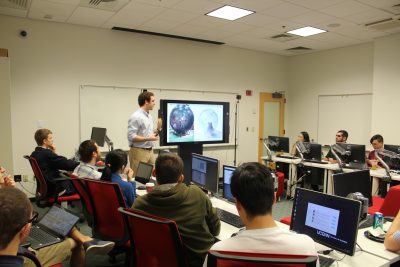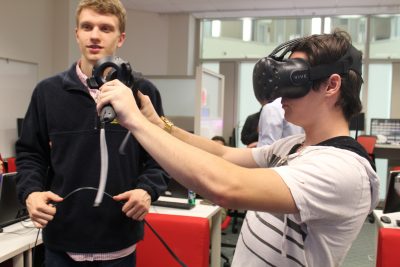On Friday November 3, the Operations and Information Management (OPIM) team held one of its most successful workshops to date in the Gladstein Lab on Unity Virtual Reality (VR) Programming. The workshop, led by adjunct professor Stephen Fitzgerald, focused on acquainting people with Unity VR by “showing its historical progression, introducing students to the equipment, and teaching students how to stage a virtual reality space and make a virtual environment.”
 Virtual reality can be run through many different platforms but Professor Fitzgerald focused on the Unity software for the workshop. “The Unity engine is just something that has done all the hard work for you already. So the physics and the calculation of the computer code has all been done for you.” Giving students a background on the Unity engine will help them build confidence to be able to create their own virtual reality experiences. TJ Hannon, a student lab specialist for OPIM Innovate is in charge of the Virtual Reality technology track and was helping run the workshop. The lab is currently focusing on a virtual reality hardware called HTC Vive, one of the top-tier pieces of equipment that is “a lot more immersive and gives you the potential to do a lot of different things, especially in a professional setting” Hannon stated. OPIM Innovate is also looking to develop a Unity technology track that focuses on developing these type of experiences.
Virtual reality can be run through many different platforms but Professor Fitzgerald focused on the Unity software for the workshop. “The Unity engine is just something that has done all the hard work for you already. So the physics and the calculation of the computer code has all been done for you.” Giving students a background on the Unity engine will help them build confidence to be able to create their own virtual reality experiences. TJ Hannon, a student lab specialist for OPIM Innovate is in charge of the Virtual Reality technology track and was helping run the workshop. The lab is currently focusing on a virtual reality hardware called HTC Vive, one of the top-tier pieces of equipment that is “a lot more immersive and gives you the potential to do a lot of different things, especially in a professional setting” Hannon stated. OPIM Innovate is also looking to develop a Unity technology track that focuses on developing these type of experiences.
 Although virtual reality is relatively new, its real world applications are endless. So far, it has been used to train doctors and surgeons, to treat people with anxiety and fears, to improve athletics, to train military personnel, to assist in construction and home design, and even to help paralyzed people walk again. In one instance during the workshop virtual reality was used along with a brain interface machine to restore people’s ability to walk when they were paralyzed. Because of virtual reality, paraplegics were able to have their bodies recreate cells that wouldn’t have otherwise been created in order to get themselves to walk again.
Although virtual reality is relatively new, its real world applications are endless. So far, it has been used to train doctors and surgeons, to treat people with anxiety and fears, to improve athletics, to train military personnel, to assist in construction and home design, and even to help paralyzed people walk again. In one instance during the workshop virtual reality was used along with a brain interface machine to restore people’s ability to walk when they were paralyzed. Because of virtual reality, paraplegics were able to have their bodies recreate cells that wouldn’t have otherwise been created in order to get themselves to walk again.
“The potential is limitless,” said Hannon about the future of virtual reality. Professor Fitzgerald stated “Right now the software is lacking graphically and the hardware can’t keep up with desired output, but if the right software and the right minds get a hold of the technology VR could change the world as we know it.” This workshop focused on giving people more exposure to the field as well as the tools needed to succeed.
The next workshop will be held on Friday, November 10, on an Introduction to Blockchain in the OPIM Gladstein Lab on the third floor of the School of Business.